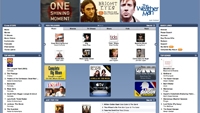EMI drops copy protection on music downloads

In what could have far-reaching implications for content owners, EMI — one of the big four record companies — announced that beginning in May its digital music catalog will available for sale in high-quality versions without copy protection.
Apple iTunes will be the first retail outlet for the downloads, which are free of digital rights management (DRM) restrictions.
"In all of the research, consumers tell us overwhelmingly that they would be willing to pay a higher price for a digital music file that they could use on any player," said Eric Nicoli, CEO of EMI Group. "It's clear to us that interoperability is important to music buyers and is a key to unlocking and energizing the digital business."
Apple CEO Steve Jobs, who had called for the removal of DRM from downloaded music, termed the announcement a landmark event. He said that the high-quality songs would be encoded at 256kb/s AAC instead of 128kb/s AAC used for the standard songs. The new songs will carry a higher price of $1.29 — 30 cents more than current songs available on iTunes.
Users, he said, will not be forced to pay the higher prices if they don't want to. The higher-quality DRM-free songs will be an addition to the store, not a replacement for what is already being offered. Users can still choose to purchase DRM-encoded tracks for about $1 per song.
Earlier, Jobs had argued that there appeared to be no benefit for the record companies in selling more than 90 percent of their music without DRM on compact discs, while selling the remaining small percentage of music online encumbered with DRM.
Executives at several rival record companies questioned whether EMI had done sufficient market research to justify the move. But EMI is just the first, according to Jobs. He told the IDG News service that Apple expected well more than half of the songs on the iTunes Store to be DRM-free by the end of the calendar year.
The professional video industry's #1 source for news, trends and product and tech information. Sign up below.
When Jobs proposed removing DRM from songs in an open letter earlier this year, he was bombarded with harsh criticism from content owners.
"Hopefully, by our actions here today and over the coming months, they will conclude that we are continuing to do exactly what has earned us these number one positions — doing the right thing for the customer," Jobs said. "The right thing for the customer going forward is to tear down the walls that preclude interoperability by going DRM free."
